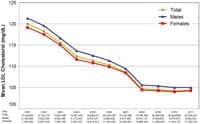Initial findings from the largest-ever randomized trial for lung cancer using autoantibody biomarkers has delivered encouraging early results.1 Sponsored by National Health Service Scotland, the Early Cancer Detection Test-Lung Cancer Scotland (ECLS) study uses the EarlyCDT-Lung blood test developed by Oncimmune Ltd, Nottingham, UK.
Preliminary findings, presented at the 2015 World Conference on Lung Cancer sponsored by the International Association for the Study of Lung Cancer, yielded a cancer detection rate (sensitivity) of 81%, a figure that is considerably better than the stated test performance of 41%. The positivity rate was as expected, with a specificity of 91%. Data from the control arm of the study has not been formally assessed, but will be collected for analysis at the end of the study.
“ECLS has recruited nearly 10,000 patients to date and will complete the recruitment of an additional 2,000 patients in early 2016, with full results available after two years of follow-up,” says Frank Sullivan, MBChB, PhD, professor and director at the Scottish School of Primary Care in Dundee, Scotland, and the study’s chief investigator. “It has been a major effort to recruit such an impressive number of study participants.”
First announced in March 2012, the ECLS study is designed to determine whether use of the Oncimmune blood test leads to earlier detection of lung cancer and can help to save lives in the long term. The test measures a panel of seven autoantibodies to detect the presence of lung cancer.
For the study, patients who were identified as being at high risk of lung cancer and received a positive result after taking the blood test were triaged into a higher risk group and referred for x-ray and low-dose computed tomography (CT). Findings suggest that this high-risk selection protocol results in fewer low-dose CT scans, but with the same, already established National Lung Screening Trial mortality benefit of low-dose CT scans.2
“We are pleased by the initial results of this independent study, which support the wealth of data on the use of autoantibodies in cancer detection and are consistent with our previous EarlyCDT-Lung validation studies,” says Geoffrey Hamilton-Fairley, chief executive at Oncimmune. “If these results continue, it will further underpin the rationale of the ECLS study—namely that screening with the EarlyCDT-Lung blood test can be effective for the early detection of lung cancer, helping to save lives and money. We look forward to ECLS reporting updates on an ongoing basis.”
Further interim results will be announced over the next 3 years, with final publication expected in 2018–2019. Study results will better inform the NHS’ decision about whether to offer the EarlyCDT-Lung blood test as a nationwide screening test in the future.
Lung cancer kills more people than any other cancer worldwide, with more than 1.5 million deaths globally in 2012. In Scotland, nearly 5,000 people die from lung cancer every year.3
For more information, visit the home page of the Early Cancer Detection Test-Lung Cancer Scotland.
REFERENCES
- Sullivan F, Schembri S. Progress with a randomized controlled trial of the detection in blood of autoantibodies to tumor antigens as a case-finding method in lung cancer using the EarlyCDT-Lung test in Scotland (ECLS) [Presentation abstract no. 48]. Denver: International Association for the Study of Lung Cancer World Conference on Lung Cancer, September 6–9, 2015
- National Lung Screening Trial: questions and answers [online]. Bethesda, MD: National Cancer Institute, 2014. Available at: http://www.cancer.gov/types/lung/research/nlst-qa. Accessed October 15, 2015.
- Lung cancer incidence statistics [online]. London: Cancer Research UK, n.d. Available at: http://www.cancerresearchuk.org/health-professional/cancer-statistics/statistics-by-cancer-type/lung-cancer/incidence. Accessed October 15, 2015.







